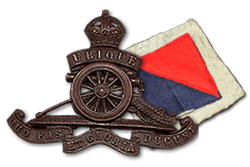45th Light Anti-Aircraft Regiment, Royal Artillery
| 45th Light Anti-Aircraft Regiment, RA | |
|---|---|
|
Royal Artillery cap badge and AA patch | |
| Active | 1940–1945 |
| Country |
|
| Branch |
|
| Role |
Air Defence Garrison Line of Communication |
| Size | Regiment |
| Part of | Royal Artillery |
| Engagements |
The Blitz Tunisian Campaign Italian Campaign |
- 45th Garrison Regiment, Royal Artillery and 603rd Infantry Regiment, Royal Artillery redirect here
45 Light Anti-Aircraft Regiment, Royal Artillery (45 LAA Regt), was a British Territorial Army unit of the Royal Artillery formed in July 1940.[1][2]
Home Defence
During The Blitz of 1940–41, 45 LAA Regt served in 1st Anti-Aircraft Brigade of 11th AA Division, covering the industrial town of Crewe.[3][4][5]
North Africa
In 1942, equipped with 40 mm Bofors guns, 45 LAA Regt was attached to Allied Force Headquarters for Operation Torch, the invasion of North Africa.[1][6] The troop convoys assembled in the River Clyde in October 1942 and sailed to North Africa, where the British troops began landing at Algiers on 8 November. The force then moved eastwards to seize the port of Bougies and Djidjelli airfield, 45 LAA Regt following them by sea. It had been intended to land two LAA troops on the beaches near Djidjelli, but sea conditions prevented this and the whole regiment disembarked at Bougies.[7]
Axis air command reacted quickly to the Allied invasion. As the AA troops moved into their positions they were dive-bombed in the open, particularly at Djidjelli. Here a battery of 45 LAA Regt and a troop from 58th HAA Rgt rapidly organised barrages in close defence, so effectively that three enemy aircraft were destroyed and the gun positions survived. There was a repeated attack, by Ju 87s and Ju 88s flying at 5000–6000 feet, on 22 November, which lasted two hours.[8]
In January 1943, as the Tunisian Campaign developed, 45 LAA Regt was assigned to British First Army.[1][6] While V Corps advanced towards Tunis through rough country and steep-sided valleys. 45 LAA Regt accompanied it to provide AA cover. A large number of small actions were fought by isolated AA troops against fast, low-flying attacks. In these 'snap' engagements the No 3 LAA Predictor was useless and deflection fire had to be judged using the visual Correctional Sight, known as the 'Stiffkey Stick'. Off-road deployment was so limited by soft ground that the regiment issued an order that no Bofors gun should be positioned further from hard going by more than the length of its tractor's tow rope.[9]
By Mid-March 1943, 45 LAA Regt was assigned to provide LAA cover for French XIX Corps, which had joined the Allied force.[10] In the final phase of the campaign (Operation Vulcan), 45 LAA Regt formed part of 52nd AA Bde, which held a number of AA units on their wheels and ready to move into the objectives of Tunis and Bizerta immediately behind the leading battle groups. They deployed in Tunis on 7 May before the last German combat groups had been cleared out.[11]
Italy
45 LAA Regiment was not involved in the Allied invasion of Sicily (Operation Husky), but entered the Italian Campaign as part of the British Eighth Army, commanded by Lieutenant General Sir Oliver Leese, in early 1944 when it joined the 66th AA Brigade .[1][12] The brigade had been defending the Salerno landing area and airfields supporting the American Fifth Army, under Lieutenant General Mark Clark. After the breakout from the Anzio beachhead, in May 1944, it took over defence of that area, and as the Fifth Army advanced to Rome and beyond it followed up. However, the regiment had left the brigade by October 1944 [13]
Infantry
By late 1944, the German Luftwaffe was suffering from such shortages of pilots, aircraft and fuel that serious aerial attacks could be discounted. 45 LAA Regt was therefore returned to Home Forces in the United Kingdom and converted into 45 Garrison Regiment RA.[1][2][14]
In February, retrained as infantry and retitled 603 Infantry Regiment RA, the regiment returned to Eighth Army in Italy for line of communication and occupation duties.[2][12][15]
Notes
- 1 2 3 4 5 45 LAA Regt at RA 1939–45.
- 1 2 3 Farndale, Annex M, p. 336.
- ↑ Farndale, Annex D, p. 260.
- ↑ Routledge, Table LXV, p. 396.
- ↑ 11 AA Div at RA 1939–45.
- 1 2 Joslen, p. 465.
- ↑ Routledge, pp. 178–9.
- ↑ Routledge, p. 180.
- ↑ Routledge, pp. 182–3, 187; Table XXX, p. 188.
- ↑ Routledge, Table XXXI, p. 189.
- ↑ Routledge, pp. 185–6; Table XXXII, p. 190.
- 1 2 Joslen, p. 467.
- ↑ Routledge, pp. 285–6; Table XLVII, p. 296.
- ↑ 45 Garrison Regt at RA 1939–45.
- ↑ 603 Infantry Regt at RA 1939–45.
References
- Gen Sir Martin Farndale, History of the Royal Regiment of Artillery: The Years of Defeat: Europe and North Africa, 1939–1941, Woolwich: Royal Artillery Institution, 1988/London: Brasseys, 1996, ISBN 1-85753-080-2.
- Lt-Col H.F. Joslen, Orders of Battle, United Kingdom and Colonial Formations and Units in the Second World War, 1939–1945, London: HM Stationery Office, 1960/Uckfield: Naval & Military, 2003, ISBN 1843424746.
- Brig N.W. Routledge, History of the Royal Regiment of Artillery: Anti-Aircraft Artillery 1914–55, London: Royal Artillery Institution/Brassey's, 1994, ISBN 1-85753-099-3
